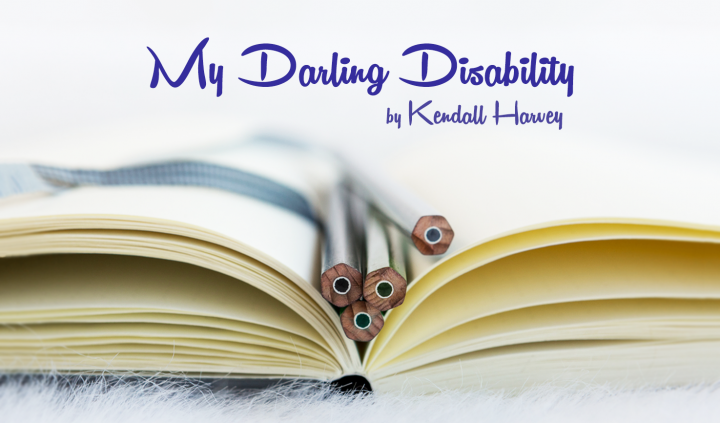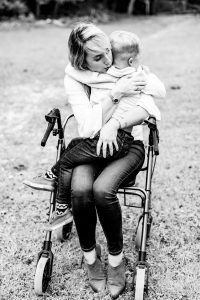Similarities in Parenting and Friedreich’s Ataxia

At first, I resented having Friedreich’s ataxia (FA) because it hasn’t allowed me to be the mom I always imagined I would be. Now that I have a couple of years of parenting experience under my belt, I see some similarities between life with kids and life with progressive disease. For example:
You learn something new every day
You learn how to be a nurse, chef, stylist, professional packer, nutritionist, personal trainer, chauffeur, counselor, event planner, maid, personal shopper, teacher, rock star, and a Pinterest-worthy crafter. And you hone those skills daily. You also learn things you never thought you’d learn based on your kids’ interest, such as all the words to the “Moana” soundtrack, the correct name of every construction truck, the starting lineup for the Houston Astros, what Daniel Tiger is allergic to, and the favorite color of complete strangers.
Right when you think you’ve got things figured out, FA creeps into a new area of your life and demands more readjustments. So, you learn new, creative ways to get things done.
The Friedreich’s Ataxia News forums are a place to connect with other patients, share tips and talk about the latest research. Check them out today!
No control
When you have kids, you learn that you have no real control over what they do or say. They are their own people with their own thoughts, feelings, inclinations, and impulses. The best you can do is try to equip them to become kind, decent, intelligent contributions to society. You can’t really make them do what you want or think they should do. Our kids will become who they were meant to become — we can just try to steer them toward greatness.
FA is progressive and relentless. It’s in our genes — in our very DNA. We can try to strengthen certain muscles or practice certain adaptive techniques, but we can’t control what FA does to our bodies. We can just do our best to get safely through the day.
Complete strangers feel entitled to your story
When you’re out and about with your kids, people will stop you and ask how old your kids are, comment on their looks, offer unsolicited parenting advice, etc. Fortunately, most of this is harmless and carries no ill intentions. But sometimes it’s unwelcome. Every now and then, when a mom is having a really bad day and her baby is throwing a tantrum at the grocery store because they couldn’t get the green race car shopping cart, that mom probably doesn’t want to hear about how gymnastics class transformed your neighbor’s son by channeling his excess energy. (True story from a fellow mom friend!)
One day, I was out running errands. When possible, I just use the shopping cart as a walker. I parked in a handicapped spot and snagged a nearby stray cart. A very old man parked at the same time as me in the handicapped spot across from me. He said, “Why did you park there, are you even handicapped?” I said, “Not that it’s any of your business, but yes. I have a genetic disease that is taking away my ability to walk. I park in handicapped spots to limit the distance I have to walk, and I need the wider spaces to get safely in and out of the car. I will likely be in a wheelchair in five years or so. At that point, will I be ‘handicapped’ enough for you to qualify for this spot?” Then I started walking away. He said, “Huh, now that you mention it, I see it. You walk funny, almost like you’re drunk.”
It’s not what you pictured
When you were a kid first making observations about the world, you thought you would grow up and be a happy, healthy, normal person — just like everyone else. Then FA happened. With constant adjustments, you do your best to lead a “normal” life, but it’s not quite what you had in mind.
Every parent will tell you they love their kids more than they thought possible. And most honest ones also will tell you that their kids make them crazier than they thought possible. My Sunday mornings don’t look picture perfect. I imagined everyone dressed in their Sunday best, laughing while we all made waffles together and ate gorgeous fruit before happily loading up and arriving early enough to church to chat with our friends. Let me tell you how many times that’s happened: ZERO.
Both parenting and FA take a village to get through the day (for the big stuff and the little, everyday stuff). Both make you wish time would slow down. Both test you and challenge what you’re made of. Both pass through stages, and every stage brings pros and cons. Parenting and FA are both expensive, exhausting, isolating, and emotional. But both also introduce you to new communities of friends, reveal strengths, and change your perspective. You realize what’s important and pursue greatness with passion — despite circumstances.
I know it seems odd comparing the joys of parenthood to this disease, but they are two of the biggest things in my life and occupy a lot of my thoughts. I’ve learned not to let either aspect of my life define me. I find humor and sanity in these comparisons, and I hope you do, too.
***
Friedreich’s Ataxia News is strictly a news and information website about the disease. It does not provide medical advice, diagnosis or treatment. This content is not intended to be a substitute for professional medical advice, diagnosis, or treatment. Always seek the advice of your physician or another qualified health provider with any questions you may have regarding a medical condition. Never disregard professional medical advice or delay in seeking it because of something you have read on this website.









Jane Briscoe
Fortunately for me FA was mild enough to let me parent as I imagined but It is impossible to grandparent as I imagined. Can't even change a nappy to help out busy parents. However my oldest granddaughter wanted to learn to knit. I can just do it very slowly on big needles. She and I can learn together.